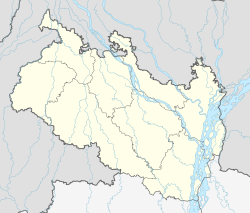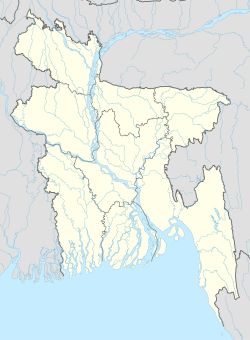Thakurgaon is a city in northern Bangladesh. It is the headquarters of Thakurgaon District and Thakurgaon Sadar Upazila.# Thakurgaon District
- Introduction
Thakurgaon | |
|---|---|
 Thakurgaon | |
| Coordinates: 26°01′55″N 88°27′58″E / 26.032°N 88.466°E | |
| Country | |
| Division | Rangpur |
| District | Thakurgaon |
| Upazila | Thakurgaon Sadar |
| Population (2022) | |
• Total | 100,459 |
Thakurgaon is a district located in the northern part of Bangladesh, part of the Rangpur Division. Known for its agricultural richness and cultural heritage, Thakurgaon is bordered by India to the north and features a predominantly rural landscape.
Thakurgaon consists mainly of flat alluvial plains, which are fertile and suitable for agriculture. The region is characterized by low-lying land with some elevated areas.
The Brahmaputra River and its tributaries flow through or near the district, providing essential irrigation and supporting local ecosystems.
Thakurgaon experiences a tropical monsoon climate, featuring three distinct seasons: a hot summer, a rainy monsoon season, and a cooler winter. The monsoon rains are crucial for agricultural productivity.
The district's soil is predominantly alluvial, rich in nutrients, which contributes to its high agricultural output.
Demographics
editAccording to the 2022 Bangladesh census, Thakurgaon city had a population of 100,459 and a literacy rate of 88.42%.[2]: 388–394
According to the 2011 Bangladesh census, Thakurgaon city had 18,015 households and a population of 80,589. 15,167 (18.82%) were under 10 years of age. Thakurgaon had a literacy rate (age 7 and over) of 74.33%, compared to the national average of 51.8%, and a sex ratio of 956 females per 1000 males. The ethnic population was 958 (1.19%).[1]
References
edit- ^ a b "Population & Housing Census 2011 (Zila Series & Community Series)". bbs.gov.bd. Bangladesh Bureau of Statistics.
- ^ Population and Housing Census 2022 National Report (PDF). Vol. 1. Bangladesh Bureau of Statistics. November 2023.
{{cite book}}: CS1 maint: year (link)

